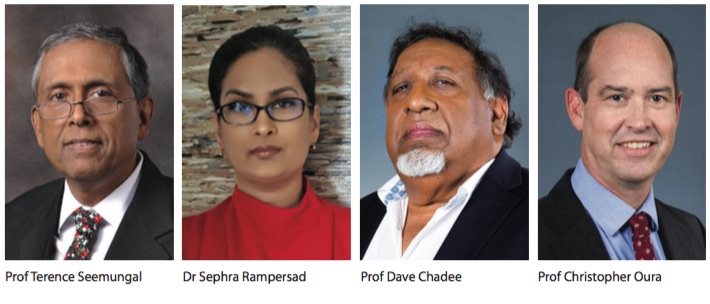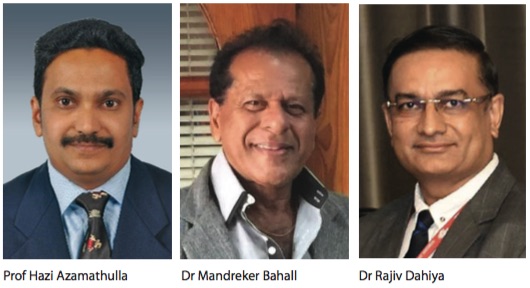
Seven researchers from UWI St Augustine have been ranked in the top two percent of their disciplines in the world. The ranking was revealed in the pages of the academic journal PLOS Biology. The list, written by authors from Stanford University, ranks more than 180,000 researchers within 22 scientific disciplines and 176 subfields in an objective and transparent process. The scientists are Professor Terence Seemungal, Professor Hazi Azamathulla, Dr Sephra Rampersad, Professor Christopher Oura, Dr Mandreker Bahall, Dr Rajiv Dahiya, and the late Professor Dave Chadee.


Commenting on the achievement, UWI St Augustine Campus Principal Professor Brian Copeland said the selections represented both the outstanding work of the individual scientists, as well as the international impact of UWI scholarship.
“When these results are considered in conjunction with the 2021 Times Higher Education institutional ranking of The UWI in the top 2.5 percent of the best universities globally, they further confirm the strategic leadership and stewardship of The UWI, its scholastic research output, and advocacy,” he added.
The list of authors consists of the names of the scientists within the top two percent of their main subfield discipline who have published at least five papers. The selection is based on the top 100,000 by number of citations (with and without self-citations) or a percentile rank of two percent or above. These database rankings are globally recognised, and are based on an analysis of data available in the Scopus database (a database of abstracts and citations in peer-reviewed academic journals), which is itself the standard for extracting publication data for researchers worldwide.
“We have emphasised research at the Faculty of Medical Sciences (FMS) over the past few years and I am pleased to see the success,” said Prof Seemungal, who is both one of the seven scientists and Dean of FMS. “The Faculty has also had a major focus on COVID-19 and I expect quite a few publications in this area over the next few years. We have several very gifted junior researchers in FMS and I expect they will uplift us further over the next few years.”
Apart from his career as an educator and researcher focused on areas like pulmonology, infectious diseases, and asthma, Prof Seemungal is a member of The UWI COVID-19 Task Force, and was regularly featured in the national media, providing his expertise and opinion as part of Trinidad and Tobago’s national strategy in combatting the pandemic.
Dr Sephra Rampersad, the lone lady scientist among The UWI seven, said, “It is extremely rewarding to have my research measured against globally valued qualifications. I am grateful for the support of my colleagues, the diligence of my students, and proud to be a product of the UWI St Augustine and the Department of Life Sciences (DLS).
Dr Rampersad is a Senior Lecturer in Biochemistry at (DLS) in the Faculty of Science and Technology. Her research is based on the study of microbial evolution, population dynamics and genetic diversity as pathogens in plant disease and as survivalists in harsh terrestrial environments. More recently, her focus has included investigating the genomes of microbes with specialised capabilities to metabolise compounds that are important to a range of industries. Her research has a direct impact on food security, understanding ecosystem partnerships and metabolic engineering.
The other scientist on the list from Life Sciences is the late Prof Dave Chadee. Known casually as “Mosquito Man”, Prof Chadee was one of the world’s foremost experts on vector-borne diseases and the Aedes aegypti mosquito. His work positively affected the lives of hundreds of millions of people across the world through research into mosquito-spread diseases such as dengue fever, yellow fever, malaria and the Zika virus. He helped to pioneer the development of mosquito traps, new disease surveillance systems, and new control strategies.
Christopher Oura, Professor of Veterinary Virology at the School of Veterinary Medicine within FMS, is also a member of The UWI COVID-19 Task Force. Among his research interests is veterinary virology, and his expertise was highly useful in understanding the pandemic and how diseases move from animals to humans.
Prof Oura, who leads a One-Health-based research programme concentrating on zoonotic and animal pathogens of importance within the Caribbean region, said, “Being a researcher is all about discovering things that make a real difference and improve people’s lives. This recognition means a lot to me, as it means I have done just that. Working in the Caribbean and at The University of the West Indies School of Veterinary Medicine is a privilege, and I hope to make many more important discoveries that will improve the lives of Caribbean people and Caribbean animals, in the years to come.”
Although it might be assumed that rankings of scientists in a biology publication would come from the natural and medical sciences, a UWI engineer also made the list. Prof Hazi Azamathulla, a lecturer in Civil and Environmental Engineering at the Faculty of Engineering, focuses on water resources engineering, physical hydraulic model studies, hydroinformatics, and climate change.
“I am very humbled by this achievement,” he said. “For over 20 years, I have been actively involved in research in water resources engineering. This research has taken me all over the world and allowed me to contribute to changing the landscape as it pertains to water resources.”
In Trinidad, Prof Azamathulla said, his research “has been looking at rivers with low discharge flows”. This can have wide reaching implications for the Caribbean, as the rivers are subjected to low flows in the dry season.
Dr Mandreker Bahall is an associate lecturer at the School of Medicine and The UWI Arthur Lok Jack Graduate School of Business who specialises in cardiology. He has very interesting and timely research specialties - patient satisfaction, expanding to the quality of life of patients with cardiac diseases with and without depression, access to public healthcare and equity, and methods for mitigating issues in the Trinidad and Tobago healthcare system related to overcrowding.
“I feel very happy,” he said of the recognition of his work. “This serves as a further motivation and reminder for me to keep expanding my research.”
Dr Bahall explained that his scholarship originated from “constant dreaming and identifying gaps, predominantly in societal issues”.
Echoing his happy sentiments was Dr Rajiv Dahiya, Director of The UWI School of Pharmacy within FMS and Senior Lecturer in Pharmaceutical Chemistry. Dr Dahiya, whose area of research is natural peptide synthesis, said he was “very glad” that his name is included among the top two percent of all world researchers in his discipline - Pharmaceutical Sciences. He thanked the entire campus community for supporting him.